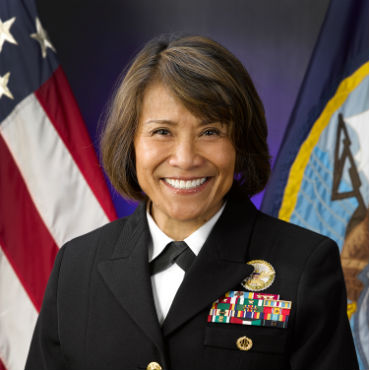DHA director touts 'more complete' DOD health record

Defense Health Agency Director Vice Adm. Raquel Bono said the new electronic health record system will enable DOD to provide more complete, responsive and effective health care.

Vice Adm. Raquel Bono, director of the Defense Health Agency, said she has expanded her definition of interoperability for DOD's new electronic health record system.
Defense Health Agency Director Vice Adm. Raquel Bono said the Defense Department's new $4.3 billion commercial electronic health record system will enable greater patient involvement and provide more complete, responsive and effective health care.
Bono credited broadening the definition of interoperability beyond the confines of connectivity and data sharing between DOD and the Department of Veterans Affairs with playing a key role in her agency's approach to the MHS Genesis system.
"I've expanded my definition of interoperability, and it's no longer just between federal partners," she said at AFCEA Bethesda's Health IT Day on Oct. 12. "I've got a better understanding of what interoperability looks like.... I'm looking at private interoperability, but more importantly, and the driver for me, is the interoperability within my hospital walls."
Bono said MHS Genesis' flexibility will allow for a more comprehensive, data-driven approach to medical care for veterans. She added that a large part of the transition effort is rationalizing the portfolio of medical programs and making sure devices have a viable interface.
"Because the rate of change is so rapid, I realized I can't overlook...small innovative startups and some of the innovations that are already out there," she said.
Nevertheless, Bono said she wants to make sure the most important aspect of the medical care process does not get overlooked: the patients' needs.
"Patients should be our disruptive innovators," she said. "The more patients become interested and involved in their health data, the more they will drive some of the impetus for change."
DHA's role in advancing MHS Genesis is "how we can provide...that structure and that support to start designing a health care system around our patients, rather than asking our patients to rearrange their lives around our health care system," Bono added.
She cited access across devices and reminders sent directly to patients as examples of how MHS Genesis can help DOD be more responsive to patients' needs.
In addition, she said the challenge lies not the technology itself but in implementing it in a way that reduces variability, does not disrupt doctors' ability to care for their patients and does not distract from patient care.
"We definitely don't want to change [clinical] workflows just to be able to accommodate electronic needs," she said. "So we addressed that very early on.... That's why we invited the providers in to make sure these workflows make tons of sense."
Bono added that patients are better prepared for certain innovations, such as sharing data, than doctors are, though she has witnessed early successes.
By consulting with providers and clinicians, "the adoption curve is much faster," she said. "I think having a patient portal where patients can directly talk with their providers is also another driver for that kind of change.... You have to start somewhere."
She also acknowledged the delay in the system's launch, saying the additional time for testing would not affect major milestones.
"At the heart of it, what we wanted to do was launch a product that worked from Day One for our providers and patients," Bono said. "And so we realized we had to slow down just a little bit to make sure we had enough space to test those interfaces. However, it didn't mean we had to slow down anything else."
NEXT STORY: Satellite, data projects on White House agenda


